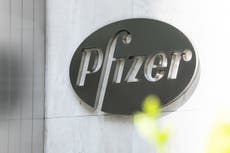NHS and military preparing for mass vaccination programme
Nationwide roll out of vaccine will be based on speed and targeting at risk groups first

Your support helps us to tell the story
From reproductive rights to climate change to Big Tech, The Independent is on the ground when the story is developing. Whether it's investigating the financials of Elon Musk's pro-Trump PAC or producing our latest documentary, 'The A Word', which shines a light on the American women fighting for reproductive rights, we know how important it is to parse out the facts from the messaging.
At such a critical moment in US history, we need reporters on the ground. Your donation allows us to keep sending journalists to speak to both sides of the story.
The Independent is trusted by Americans across the entire political spectrum. And unlike many other quality news outlets, we choose not to lock Americans out of our reporting and analysis with paywalls. We believe quality journalism should be available to everyone, paid for by those who can afford it.
Your support makes all the difference.An unprecedented mass vaccination drive to end the pandemic threat is being planned by the NHS and military as hopes rise of an effective vaccine.
The army is bringing its logistical expertise to bear on the challenge of how to quickly get the vaccine to communities up and down the country with speed considered to be of the essence by health chiefs.
Officials are working on a multi-pronged approach that will involve mass vaccination centres being set up in large venues such as conference halls and schools as well as smaller mobile and pop-up vaccination units working seven days a week alongside traditional venues such as GPs and pharmacies.
The vaccine drive, which may be forced to use multiple different vaccines depending on the success and available supplies of individual drugs, will also need huge numbers of personnel including vaccination teams that will need to visit the frail and elderly in their own home.
The latest coronavirus data reported on Tuesday revealed there had been 532 deaths reported in the last 24 hours – the largest death toll for six months. There were 20,000 positive infections and more than 13,000 patients now in hospital.
In the House of Commons on Tuesday, health secretary Matt Hancock said cities including London, Manchester, Birmingham, Newcastle, Nottingham and Bristol will be given access to more community testing. He warned news of the Pfizer vaccine was welcome but added “there are no guarantees”.
Mr Hancock added: “If this or any other vaccine is approved, we will be ready to begin a large-scale vaccination programme.”
The plans are being drawn up ahead of the expected approval of at least one of the leading vaccines currently in development that could come as soon as the end of this year.
The UK’s medicines regulator, the Medicines and Healthcare Products Regulatory Agency (MHRA) is staying tight-lipped over how quickly it will be able to sign-off on any vaccine but it has launched “rolling reviews” to consider the data from developers in real time.
It’s hoped the approach will lead to a radically shortened time between the vaccine trials ending and the MHRA approving a vaccine for use although the regulator has stressed it will not be compromising on safety.
News that Pfizer’s Covid-19 vaccine is more than 90 per cent effective against the virus, based on early trial data, has triggered cautious optimism in Whitehall although full results are not yet available. The vaccine is one of 11 in the final stages of development.
The vaccine requires long term storage at ultra-low temperatures which will require specialist freezers but in a boost to plans to roll out a mass vaccination drive the vaccine can be stored at normal refrigeration levels five days before use – which makes it possible to store some vaccines locally.
Health chiefs are aiming to build on lessons learned during the first wave of the pandemic when the military was called on to help deliver protective equipment to hospitals 24 hours a day and has also been used in recent days to help set up mass testing in Liverpool.
Crucial to the success of the vaccination programme and ending the public health emergency will be the speed with which those people identified as being in vulnerable groups can be inoculated.
This will depend on the overall supply of vaccines and their success at stopping people becoming seriously ill.
Those in the most high-risk categories such as the elderly, frail and their carers and health workers will be among the first to be given the vaccine. Younger, healthier and less at risk members of society will have to wait.
It’s possible some of the vaccine’s being worked on are less successful than the Pfizer treatment and these vaccines may still be used once supplies of other jabs start to run low.
Experts on the government’s Joint Vaccination and Immunisation Committee will be constantly re-considering the data on vaccines as the data emerges and the state of the pandemic situation in the UK. It will advise on the best use of the vaccines to deliver the maximum impact on the virus.
This could include different vaccines being adopted for different groups of people depending on their risk of severe disease and also efforts to reduce spread of the virus. It’s not known yet which vaccines could be effective at preventing the virus spreading between people.



Join our commenting forum
Join thought-provoking conversations, follow other Independent readers and see their replies
Comments